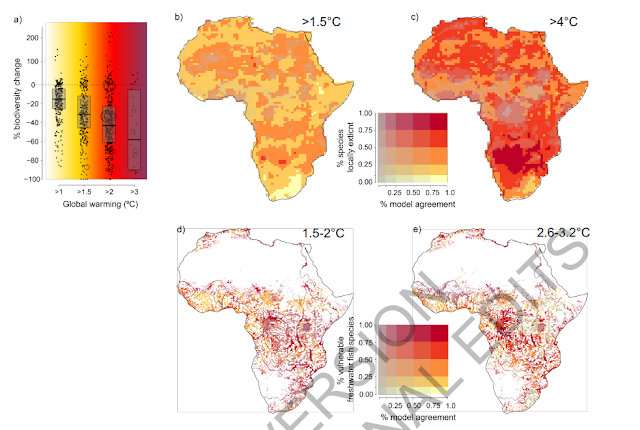As a continent, Africa has undoubtedly drawn the shortest climate straw, having contributed the lowest amount of greenhouse gas but receiving an outsized portion of the effects. This widespread climate-related damage has assumed many forms including, with a high degree of confidence, biodiversity loss, water shortages, reduced food production, loss of lives and reduced economic growth. Anticipated global warming between 1.5°C/2.7°F and 2.0°C/3.6°F are expected to accelerate these trends especially in Africa, increasing economic inequality, poverty, illness and death rates, and choking off economic and social development. In aggregate, climate change is proving especially unjust to Africa.
Due to the comparatively small national economies and poor, unstable national governments, data for Africa is extremely sparse. Mechanisms and dynamics of climate change are less understood for that continent than for the industrialized nations in Europe and North America. But this does not shield us from the reality that increasingly arid conditions throughout northern, eastern and southern portions of the continent are contributing to food wand water insecurity for hundreds of millions of people. It has been estimated that Africa’s economic growth between 1991-2009 has been stunted by 10% or more due to the destabilizing effects of global warming, including aridifcation, floods and droughts, loss of biodiversity, disease outbreaks and heat-related trauma.
Lake and river temperatures, rising around the world, have risen in the last 50 years and will experience heat waves of increasing severity and frequency as global temperature increases. All glaciers are epexcted to disappear from Mt. Kenya and Mt. Kilamanjaro by 2040. Rainfall, as in most rainy regions around the globe, is expected to increase in aggregate, but via fewer, more destructive rainfalls, and not via an evenly spread rainy season. The monsoon from the Atlantic is expected to become more erratic, and east coast cyclone landfalls from the Indian Ocean are predicted to become fewer but more intense.
All of these will damage crop viability as well as social and economic stability. Already Africa’s agricultural production has suffered more than any other continent’s, with an estimated 34% reduction in produce due to climate change-related causes since 1961. The rainy growing season has been shrinking and will continue to as the planet continues to warm.
Further, Africa’s rapid urbanization along the coast is under threat from rising seas and groundwater withdrawal. Most of these new cities do not have, and their countries cannot afford, the sophisticated flood control measures present in the Netherlands and Venice: the curse of the developing world. In playing economic catch-up, from a position of relative disadvantage to the already-industrialized nations, African countries are facing drastic and expensive climate change-related problems which they did not author, but are among the first to confront. This is climate injustice, written in human misery.
Tomorrow: Asia.
Be brave, be steadfast, and be well.













No comments:
Post a Comment